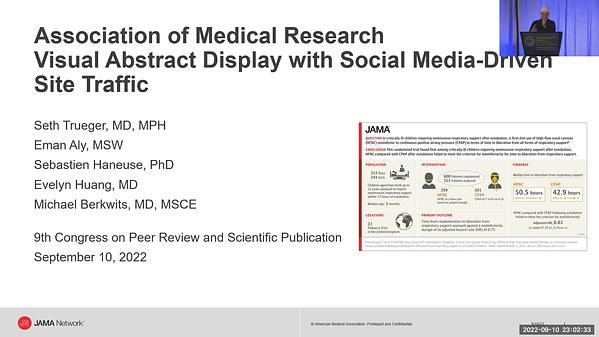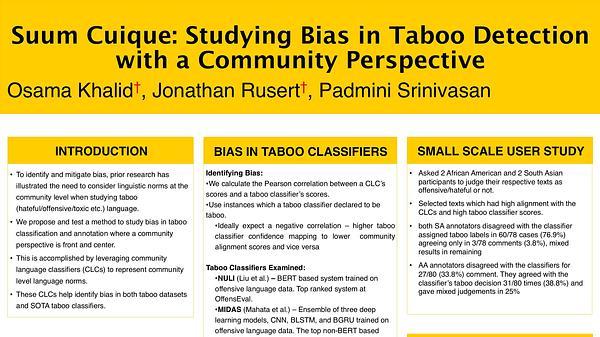poster
Results Availability and Timeliness of Registered COVID-19 Clinical Trials During the First 18 Months of the Pandemic
keywords:
trial registration
pandemic science
publication
bias
Objective Transparent, timely results dissemination prevents bias and reduces waste in clinical research. Global emergencies, like COVID-19, increase the necessity of timely and complete reporting.1 The World Health Organization (WHO) has emphasized the importance of rapid sharing of clinical data and results during public health emergencies.2 The Dissemination of Registered COVID-19 Clinical Trials (DIRECCT) project examines how and when COVID-19 clinical trial results are disseminated.
Design Trials completed during the first 18 months of the pandemic on interventions for the treatment and prevention of acute COVID-19 were examined using the WHO International Clinical Trials Registry Platform COVID-19 study database. Following a minimum delay of 6 weeks between trial completion and searches, automated and manual searches for results publications in PubMed were conducted using Peer Review of Electronic Search Strategies (PRESS) for COVID-19 trial publications from the COVID- evidence project and were supplemented by automated searches for trial identification numbers in the CORD-19 database, manual checks of trial registries and the Cochrane COVID-19 Study Register, and manual keyword searches in trial identification numbers and targeted keywords across CORD-19, the Cochrane COVID-19 Study Register, PubMed, Europe PMC, Google Scholar, and Google. Reporting rates overall and by dissemination route (ie, journal article, preprint, or registry) were described, and time to report across routes was evaluated using survival analysis methods. In addition, data from the registered intervention arms from all trials were extracted to characterize reporting of the most commonly studied COVID-19 interventions.
Results Overall, 2621 trials completed between January 1, 2020, and June 30, 2021, were included in the analysis population and searched for results; 1638 (62%) were searched by 1 author. In the preliminary analysis of the first 6 months of the pandemic (285 trials, all dual searched), 41 trials (14%) had results available by August 15, 2020.3 The most common dissemination route was preprints (25 trials) followed by journal articles (18) and registry results (2); of these, only 4 trials were available as both a preprint and a journal article. The cumulative incidence of any reporting surpassed 20% at 119 days from completion.
Conclusions COVID-19 trials completed during the first 6 months of the pandemic did not consistently yield rapid results in the literature or on registries; however, preprints played an important role in results dissemination. These preliminary findings suggest results may be appearing more rapidly compared with clinical trial publication practices prior to the pandemic. Considering trials completed during the first 18 months of the pandemic will offer a more comprehensive picture of trial reporting during COVID-19. The variable quality of registry data potentially limits the precision and completeness of these analyses.
References
1. Jones CW, Adams AC, Murphy E, et al. Delays in reporting
and publishing trial results during pandemics: cross sectional
analysis of 2009 H1N1, 2014 Ebola, and 2016 Zika clinical
trials. BMC Med Res Methodol. 2021;21:120. doi:10.1186/
s12874-021-01324-8
2. World Health Organization. Developing global norms for
sharing data and results during public health emergencies:
statement arising from a WHO consultation held on 1-2
September 2015. Accessed June 20, 2022. http://www.who.int/medicines/ebola-treatment/blueprint_phe_datashare-results/en/
3. Salholz-Hillel M, Grabitz P, Pugh-Jones M, Strech D,
DeVito NJ. Results availability and timeliness of registered
COVID-19 clinical trials: interim cross-sectional results from
the DIRECCT study. BMJ Open. 2021;11(11):e053096.
https://doi.org/10.1136/bmjopen-2021-053096
Conflict of Interest Disclosures Maia Salholz-Hillel is employed as a researcher under grants from the German Bundesministerium für Bildung und Forschung (BMBF). Outside the submitted work, Nicholas J. DeVito has received a doctoral studentship from the Naji Foundation, has received grant support from the FetzerFranklin Memorial Fund, and has been employed under grants from the Laura and John Arnold Foundation and Good Thinking Society. No other disclosures were reported.
Funding/Support This project received funding support through grant FKZ:01KX2021 from the BMBF.
Role of Funder/Sponsor The funders had no involvement in the study design, analysis, or writing of the abstract nor the decision to submit.
Additional Contributions We acknowledge our colleagues on the Dissemination of Registered COVID-19 Clinical Trials (DIRECCT) research team who contributed to this project, primarily with extensive manual searches: Peter Grabitz, Nicole Hildebrand, Molly Pugh-Jones, Susanne Schorr, Tjada Schult, Johannes Schweitering, and Daniel Strech.


